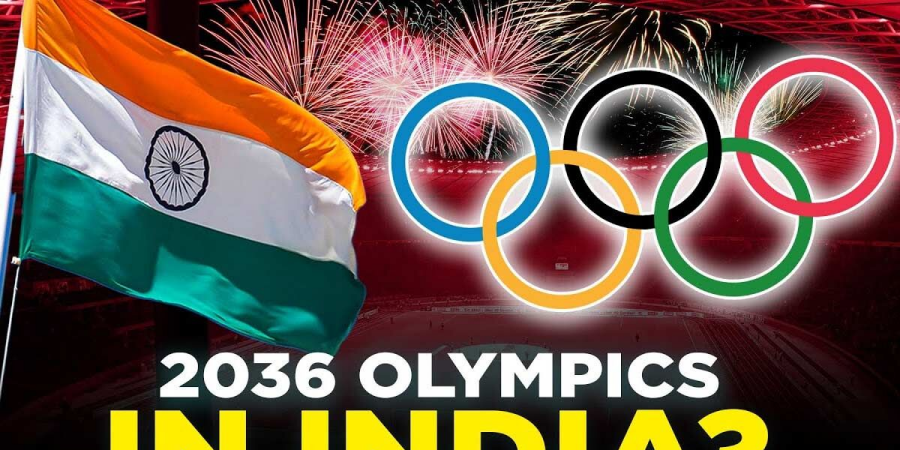

India, with its rich cultural heritage, burgeoning economy, and status as the world’s most populous nation, is an aspirant for hosting the 2036 Summer Olympics. While this ambition reflects the country’s growing global stature, it raises a significant question: Is India prepared to shoulder the logistical, infrastructural, and financial challenges of hosting one of the most prestigious global events?
India's desire to host the Olympics aligns with its aspirations of being recognized as a global leader. Hosting the Games would offer an unparalleled platform to showcase its economic progress, cultural richness, and sports development. Beyond prestige, it could spark infrastructure development, tourism growth, and a national revival of sports culture.
However, such ambitions require meticulous planning, robust financial management, and effective governance. With over a decade to prepare, the question isn’t just whether India wants to host the Olympics, but whether it can do so successfully.
One of the primary requisites for hosting the Olympics is world-class infrastructure. This includes state-of-the-art sporting venues, transport networks, accommodations, and an Olympic Village capable of housing thousands of athletes and officials.
India has some iconic sports facilities, including the Salt Lake Stadium in Kolkata, the Jawaharlal Nehru Stadium in New Delhi, and Mumbai’s Wankhede Stadium. However, most of these venues would require upgrades to meet Olympic standards. Moreover, specialized venues for sports such as sailing, gymnastics, and equestrian events, which are not traditionally popular in India, would need to be built from scratch.
Urban infrastructure, particularly in candidate cities like Delhi, Mumbai, or Ahmedabad, presents another challenge. Indian cities face perennial issues such as traffic congestion, inadequate public transport, and pollution. Hosting the Olympics would necessitate massive investments in metro networks, airports, and roadways to ensure smooth connectivity and reduce environmental impact.
Hosting the Olympics is an expensive undertaking, often exceeding initial budgets. For instance, Tokyo 2020, originally budgeted at $7 billion, ended up costing over $15 billion. India would need to allocate billions of dollars for the Games, raising concerns about the economic feasibility and long-term benefits of such an investment.
India’s track record with large-scale events like the 2010 Commonwealth Games (CWG) provides both lessons and warnings. While the CWG was widely regarded as a success in terms of showcasing India’s potential, it was also marred by allegations of corruption, mismanagement, and delays. To host the Olympics successfully, India must establish transparent governance frameworks, eliminate bureaucratic inefficiencies, and ensure accountability.
On the other hand, hosting the Olympics could yield significant economic benefits, including job creation, tourism boosts, and global business opportunities. It would also provide an incentive to modernize urban infrastructure, which could have lasting benefits for residents.
For a country that has historically underperformed at the Olympics, hosting the Games could inspire a sports revolution. Recent years have seen notable improvements in India’s sporting landscape, with athletes excelling in wrestling, badminton, hockey, and track and field events. However, India remains far from being a sporting powerhouse.
Hosting the Olympics would necessitate a comprehensive overhaul of the sports ecosystem, including investments in grassroots development, athlete training, and the establishment of new sports academies. Partnerships with international experts and organizations could help Indian athletes reach their full potential, ensuring that the host nation performs credibly on the world stage.
Beyond elite sports, hosting the Olympics could foster a culture of fitness and sports participation at the community level. With rising awareness about health and fitness, the Olympics could serve as a catalyst for long-term change.
Modern Olympic Games emphasize environmental sustainability, requiring hosts to integrate eco-friendly practices into planning and execution. India, which has made significant strides in renewable energy and sustainable urban development, would need to build on these efforts.
Ensuring green construction, minimizing waste, and utilizing renewable energy sources would be critical to meeting global expectations. With air quality being a significant concern in cities like Delhi, measures to reduce emissions and improve public transportation would be essential.
Hosting the Olympics demands impeccable governance and efficient project execution. India has faced challenges in these areas during past events, as seen during the 2010 CWG. Allegations of corruption, cost overruns, and delays tarnished the event's legacy.
To avoid a repeat of these issues, India must implement strict oversight mechanisms, engage reputable private sector partners, and ensure transparency in decision-making. Lessons from countries like Japan and the UK, which successfully hosted the Games, could offer valuable insights into planning and execution.
Securing the 2036 Olympics would elevate India’s international standing, reinforcing its image as a global leader. It would also offer opportunities for cultural exchange, showcasing India’s diversity and heritage to the world.
However, geopolitical challenges, including international relations and regional stability, must be carefully managed. Strong coordination with the International Olympic Committee (IOC) and diplomatic efforts to build consensus among member nations would be crucial for a successful bid.
India’s aspiration to host the 2036 Olympics is a bold statement of its confidence and global ambitions. While challenges abound, the opportunity to transform urban infrastructure, energize sports culture, and boost international prestige is immense. The key to success lies in meticulous planning, financial prudence, and effective governance.
With over a decade to prepare, India has the time and potential to address its shortcomings and rise to the occasion. If these efforts are executed with precision and vision, the 2036 Olympics could mark a turning point in India’s journey as a global leader.
